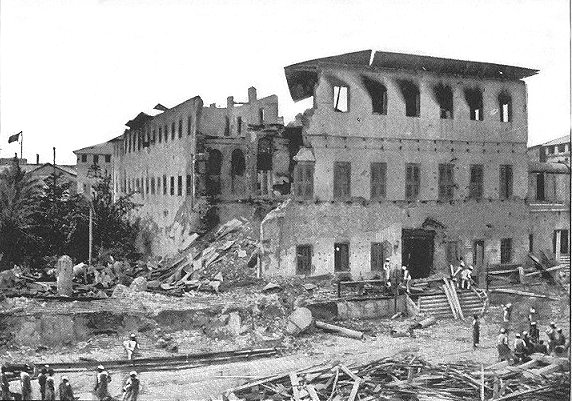The 1896 anglo-Zanzibar war between the United Kingdom and Zanzibar Sultanate is regarded the shortest war in human history, having lasted for about 38 minutes.
But how did a 30-something-minute disagreement between a protectorate, Zanzibar, and the British empire qualify as a war? Read on to find out.
It was at a time when Zanzibar was a protectorate of the British empire. During this period, any candidate qualified for accession to the sultanate must obtain the permission of the British consul, an agreement Khalid did not fulfill.
At the sudden death of Sultan Hamad bin Thuwaini, a pro-British ruler, the succession of Sultan Khalid bin Barghash, the Sultan’s nephew, on 25 August 1896 without the approval of the British empire triggered the anglo-Zanzibar war.
The British believed that Khalid was not a suitable candidate for the Sultanate as against Hamoud bin Mohammed, who was more favourable and loyal to British interests like the late Sultan.
Khalid’s unapproved succession was considered casus belli i.e an act of war by the British who gave him an ultimatum to vacate the position and leave the palace but he refused.
The then consul and diplomatic agent to Zanzibar Basil Cave and the commander of the pro-anglo-zanzibar army, Brigadier-General Lloyd Mathews also warned Khalid about the imminent effect of his action while advising him to reconsider his decision but he turned a deaf ear. Instead, he called up his palace guard and hundreds of his servants and slaves, mostly civilians, to defend the palace and locked himself up inside the pa¬¬lace.
At the expiration of the British ultimatum at 9:00 East Africa Time (EAT) on 27 August, the British had gathered two cruisers, three gunboats, 150 marines and sailors, and 900 Zanzibaris in the harbour area. Rear-Admiral Harry Rawson commanded the Royal Navy contingent, and the pro-Anglo Zanzibaris were commanded by Brigadier-General Lloyd Mathews of the Zanzibar army.
Around 2,800 Zanzibaris defended the palace, most of whom were civilians, including the sultan’s palace guard, servants, and slaves. The defenders had several artillery pieces and machine guns, which were set in front of the palace and sighted at the British ships. At exactly 09:02, the Royal Navy contingent, under the command of Rear-Admiral Harry Rawson and Matthew, bombarded the Sultan’s palace and other key locations in the city of Zanzibar.
Khalid’s forces returned fire but were no match for the superior firepower of the British. The palace was set on fire and the Sultan’s defending artillery was disabled.
Khalid managed to escape from the palace amidst the shootings and just before the palace was completely razed down by the fire. However, the war reportedly ceased around 9:40 at the end of the shelling after the palace had caught fire with Khalid’s artillery silenced and his flag cut down.
After the cease-fire, about 500 Zanzibari men and women were killed and wounded. Most of the deaths recorded were a result of the fire that engulfed the palace. Meanwhile, the only casualty recorded from the British side was a non-commissioned officer who was severely wounded but later recovered.
However, Khalid and his followers sought refuge at the German consulate which refused to release Khalid to the British despite their extradition request. According to the German Governor, the country’s extradition treaty with Britain specifically excluded political prisoners. Instead, he promised to move Khalid to German East Africa without him ever setting foot on the soil of Zanzibar.
Khalid was later captured by British forces in 1916, during the East African Campaign of World War I, and exiled to Seychelles and Saint Helena before being allowed to return to East Africa, where he died at Mombasa in 1927. The British punished Khalid’s supporters by forcing them to pay reparations to cover the cost of shells fired against them and for damages caused by the looting, which amounted to 300,000 rupees.
Meanwhile, the British loyalist, Hamoud bin Mohammed was enthroned as the figurehead sultan of a British-run Zanzibar. A position he held to save the British the costs of running Zanzibar directly as a crown colony.


